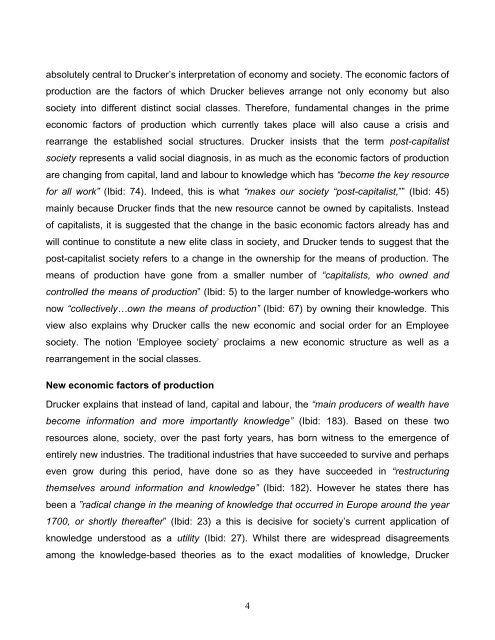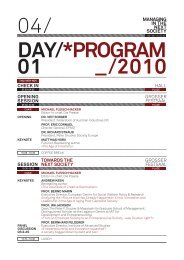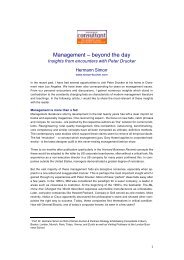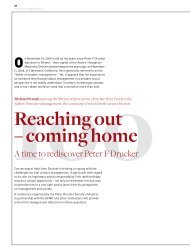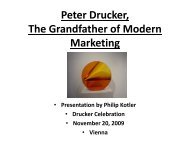From Industrial Capitalism to Taylorian Late Capitalism
From Industrial Capitalism to Taylorian Late Capitalism
From Industrial Capitalism to Taylorian Late Capitalism
Create successful ePaper yourself
Turn your PDF publications into a flip-book with our unique Google optimized e-Paper software.
absolutely central <strong>to</strong> Drucker’s interpretation of economy and society. The economic fac<strong>to</strong>rs of<br />
production are the fac<strong>to</strong>rs of which Drucker believes arrange not only economy but also<br />
society in<strong>to</strong> different distinct social classes. Therefore, fundamental changes in the prime<br />
economic fac<strong>to</strong>rs of production which currently takes place will also cause a crisis and<br />
rearrange the established social structures. Drucker insists that the term post-capitalist<br />
society represents a valid social diagnosis, in as much as the economic fac<strong>to</strong>rs of production<br />
are changing from capital, land and labour <strong>to</strong> knowledge which has “become the key resource<br />
for all work” (Ibid: 74). Indeed, this is what “makes our society “post-capitalist,”” (Ibid: 45)<br />
mainly because Drucker finds that the new resource cannot be owned by capitalists. Instead<br />
of capitalists, it is suggested that the change in the basic economic fac<strong>to</strong>rs already has and<br />
will continue <strong>to</strong> constitute a new elite class in society, and Drucker tends <strong>to</strong> suggest that the<br />
post-capitalist society refers <strong>to</strong> a change in the ownership for the means of production. The<br />
means of production have gone from a smaller number of “capitalists, who owned and<br />
controlled the means of production” (Ibid: 5) <strong>to</strong> the larger number of knowledge-workers who<br />
now “collectively…own the means of production” (Ibid: 67) by owning their knowledge. This<br />
view also explains why Drucker calls the new economic and social order for an Employee<br />
society. The notion ‘Employee society’ proclaims a new economic structure as well as a<br />
rearrangement in the social classes.<br />
New economic fac<strong>to</strong>rs of production<br />
Drucker explains that instead of land, capital and labour, the “main producers of wealth have<br />
become information and more importantly knowledge” (Ibid: 183). Based on these two<br />
resources alone, society, over the past forty years, has born witness <strong>to</strong> the emergence of<br />
entirely new industries. The traditional industries that have succeeded <strong>to</strong> survive and perhaps<br />
even grow during this period, have done so as they have succeeded in “restructuring<br />
themselves around information and knowledge” (Ibid: 182). However he states there has<br />
been a ”radical change in the meaning of knowledge that occurred in Europe around the year<br />
1700, or shortly thereafter” (Ibid: 23) a this is decisive for society’s current application of<br />
knowledge unders<strong>to</strong>od as a utility (Ibid: 27). Whilst there are widespread disagreements<br />
among the knowledge-based theories as <strong>to</strong> the exact modalities of knowledge, Drucker<br />
4


